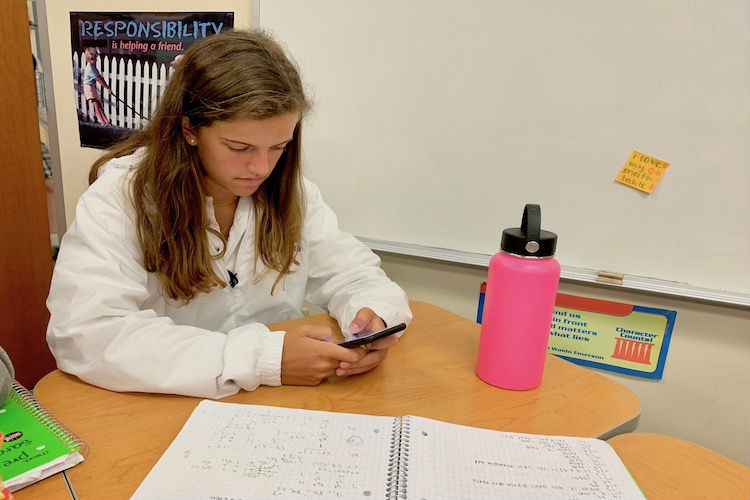//PICTURED ABOVE: Those who procrastinate tend to use their phones, distracting themselves for the moment but hurting themselves in the long run.
Procrastination.
Procrastination is the action of delaying or postponing something; it is an action that is common amongst teenagers and most adults. Although procrastination has nothing to do with self-control or productivity and can be a result of different emotions, there are many ways to avoid the causes and effects of procrastination and self-induced stress
Ashley Ferguson, an Upper School Guidance Counselor, shared her thoughts on students and procrastination.
“Students’ stress levels fluctuate depending on the time of the year; there are patterns like at the beginning of the quarter versus the end of the quarter,” Ferguson said.
Shelley Cave, the Upper School Learning Specialist, agreed with Ferguson and explained that the stress levels of students vary day to day, all caused by different things.
“Sometimes leaving things to the last minute can cause the stress level to increase, or sometimes not using time effectively can cause the stress level to increase,” Cave said.
Ferguson believes that due to the workload and rigorous academics Hockaday offers, that prioritizing classwork and homework is something that a majority of the students at Hockaday struggle with. Hesitation to do work, school or not, and self-caused stress are two things that both Cave and Ferguson have witnessed for many years.
“Procrastination is a part of everyone’s life and it is something we need to normalize,” Ferguson said.
When interviewing students at Hockaday, it was revealed that procrastination is a common trait and does greatly affect stress levels. For example, Jordan Stock, a Freshmen, regulates her procrastination and a high stress level every day because she is easily distracted, and never finishes her work.
“I procrastinate because by the time I get home from school I am just so done,” Stock said. “I go directly from classes to working out, and then go straight home; I want a break, and the break just ends up being too long.”
Izzy Page and Kaitlin Kelly, both Hockaday Sophomores, deal with procrastination on a daily basis.
“Procrastination calms me down in the moment of procrastinating, but makes me more stressed when I actually have to do the work,” Page said.
Page and Kelly both tend to procrastinate on large assignments, tests or papers; however, both students have found a way to manage their stress and complete their assignments on time. When faced with the aftermath of her previous procrastination session(s), Kelly focuses and convinces herself that she will be okay.
“In that moment, I don’t have time to worry, just work,” Kelly said.
Although procrastination is normal, Ferguson makes it clear that it cannot be your “go-to” because then it becomes your crutch or maladaptive coping skill. Furthermore, she emphasized the dangers of procrastination that it truly does more harm than good in the long run.
So, how do we fight the temptation to procrastinate? How do we decrease our stress level? Cave suggests planning your assignments and upcoming assessments to avoid procrastination and self-induced stress.
“Talk through your calendar with someone, like a trusted adult, but maybe not a parent,” Cave said. “Parents spend more time with you in the home zone versus the work zone, therefore a teacher or advisor might be best for this.”
Ferguson believes that a lack of sleep is a great cause of procrastination and self-induced stress. She explains that although studying is important, sleep is also important. The less sleep a student gets, the less she is able to focus in class, creating frustrated and irritated students.
“Plan. Sometimes procrastination is due to a lack of planning,” Ferguson said.
Stress and procrastination are a part of life, learning to control and manage those things will help you to have a successful high school career and life.
Story and Photo by Charlotte Rogers







